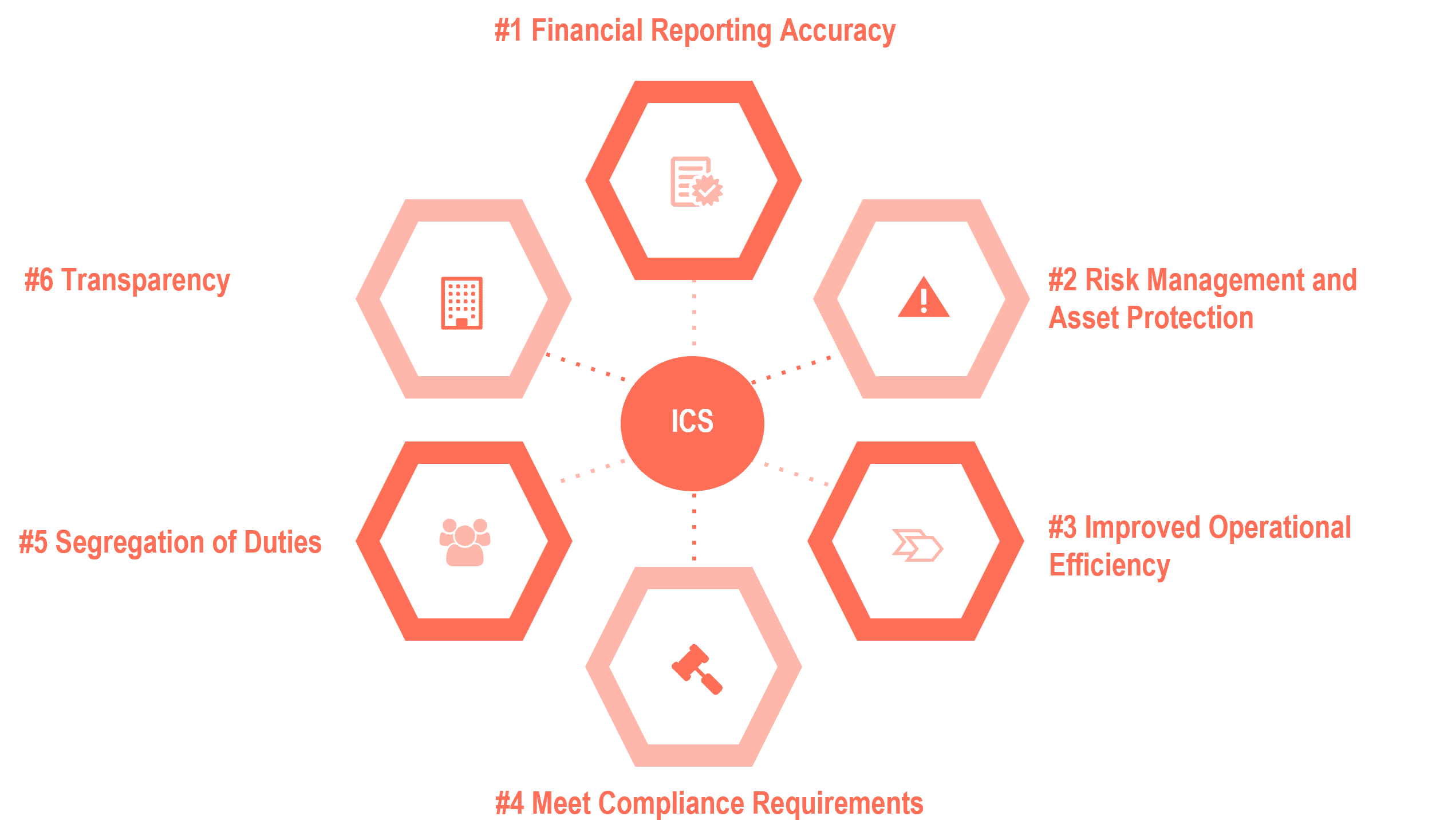Introduction
As businesses continue to grow and operate in an increasingly complex and interconnected world, the importance of having a robust internal control system cannot be overstated. An internal control system is like the backbone of an organization, providing structure, security, and oversight to safeguard its assets and processes. In this blog post, we mainly focus on and explore the various advantages and disadvantages that an internal control system brings to organizations of all sizes and industries.
Why Internal Controls
Before we take a closer look at the positive aspects of having an internal control system, let us briefly consider the function of internal controls. If you have read our blog post “Internal Control System: A Key To Driving Operational Performance”, you may already know the basics of an internal control system. If so, you can skip this section and go straight to the next section on key benefits!
In a business setting, internal controls play a crucial role by providing cohesion and consistency. They create a structured environment with established policies and processes, overseen by responsible business functions that regularly review and refine these controls to ensure their effectiveness and accuracy. In addition to protecting a company’s assets, an internal control system ensures the accuracy and reliability of financial information and describes how administrative and management responsibilities are assigned within the company. Clear policies and processes give employees a strong understanding of what is expected of them, empowering them to efficiently carry out their day-to-day responsibilities.
Let us now go further and examine the most prominent advantages of an internal control system.
Advantages of Internal Control System
Here are the 6 most important advantages:
#1 Financial Reporting Accuracy
One of the most significant benefits of an internal control system is its contribution to financial reporting accuracy. Reliable and trustworthy financial statements are essential for decision-making, maintaining stakeholder confidence and avoiding regulatory penalties. An internal control system ensures that financial data is recorded accurately and reported in accordance with accounting principles and regulatory standards.
#2 Risk Management and Asset Protection
Identifying and mitigating business risks is a crucial aspect of an internal control system. By conducting risk assessments and implementing appropriate controls, organizations can proactively address potential threats. This approach enables businesses to respond more effectively to risks and seize opportunities with greater confidence.
Furthermore, internal controls help to protect the organization’s assets from theft, fraud, and misuse. This means that the organization’s resources are less likely to be lost or wasted, helping to ensure its long-term success.
#3 Improved Operational Efficiency
A well-designed internal control system streamlines processes and workflows, leading to improved operational efficiency. By defining clear processes and responsibilities, organizations can eliminate redundancy, minimize errors, and increase productivity.
#4 Meet Compliance Requirements
In a constantly evolving regulatory environment, keeping up with compliance and governance is critical to avoid legal repercussions and establish a strong ethical and sustainable image for your business. Internal control systems assist companies in meeting regulatory requirements by ensuring that policies and processes align with relevant laws and standards. This holds particular significance for businesses in heavily regulated sectors like healthcare, finance, and energy. Moreover, a robust internal control system mitigates legal and financial risks, protecting the organization from potential lawsuits and reputational damage.
#5 Segregation of Duties
The segregation of duties is an essential part of any internal control system. This means that the company assigns different individuals to carry out specific control tasks. The idea is to prevent one person from gaining sole or excessive control and then misusing that authority for nefarious or unauthorized purposes, such as committing fraud or misappropriating company funds. Here comes also the principle of “need-to-know” into play. It requires that a user must have access solely to the information essential for their job function. This ensures that access is strictly limited to the user’s current role and only granted when there is a genuine need for fulfilling their responsibilities.
#6 Transparency
Transparency is the foundation of a trustworthy and ethical business environment. An effective internal control system fosters clear accountability and responsibility, ensuring that employees understand their roles and obligations.
If processes are clear, it is also easier to identify areas for improvement. This leads to a culture of continuous improvement within the organization, where feedback and lessons learned are used to increase efficiency and effectiveness.

As you can see there are many good reasons for having an internal control system. While the advantages of an internal control system are compelling, its implementation comes also with certain challenges. One such hurdle is for example the initial setup expenses, which may involve investing in technology, training employees, and hiring experts to design and implement the system.
But let’s have a look at the drawbacks in more detail! And luckily there are just few.
Disadvantages of Internal Control System
Here are the three most important disadvantages to consider:
#1 Cost-Intensive and Time-Consuming
The implementation of an effective internal control system can be a costly endeavor, requiring the allocation of valuable resources and considerable time to design, execute, and uphold the system. Smaller organizations, in particular, may find this expenditure burdensome. However, unlocking its true potential, an internal control system proves to be an invaluable investment that, over time, far outweighs its initial cost.
In addition, it is advisable to consider a suitable tool at this stage. Once set up, the ongoing effort can be kept to a minimum. Fast data processing, the use of workflows and automatic notifications are just some of the many benefits of tool support. If you want to know how to find the best tool, make sure you download our free ICS Criteria Catalogue. I’m sure you’ll find it useful!
#2 Unnecessary Bureaucracy
Internal controls have the potential to foster a bureaucratic environment, causing employees to direct their focus towards strict adherence to rules and processes rather than pursuing the organization’s objectives. Consequently, this emphasis on compliance may act as a barrier to innovation and creativity within the company. User-friendly tools with clear workflows and task management features free up valuable time, allowing you to focus on other important activities.
#3 False Sense of Security
Although internal controls are intended to mitigate risk, they cannot completely eliminate it. Relying excessively on these control systems may lead organizations to develop a misleading sense of security, neglecting to address risks that fall beyond the scope of these controls. Therefore, it is sometimes necessary to think outside the box. In this context, tools offer also tremendous opportunities by providing the highest possible transparency, facilitating multiple analyses, revealing trends and creating a historical record.
Summary
In summary, internal controls are the backbone of a well-structured and resilient organization. Their advantages are evident in enhancing financial reporting accuracy, proactive risk management, improved operational efficiency, and regulatory compliance.
While implementation may pose initial challenges, the long-term benefits of an internal control system are invaluable. It fosters transparency, accountability, and organizational integrity, strengthening relationships with stakeholders and ensuring ethical practices.
Embrace the power of internal controls as a strategic advantage, and let them guide your business towards a future of success and sustainability. With a robust internal control system in place, you can confidently navigate the complexities of the business world and seize opportunities for growth.





